The turmoil began when Abe was killed by an individual who claimed resentment toward the church, blaming it for his family's financial ruin due to unpaid debts he attributed to its practices. The Tokyo District Court's ruling not only dissolves the church but also strips it of its tax-exempt status and mandates asset liquidation, although it will still have the ability to function in Japan.
Authorities conducted an extensive investigation, interviewing nearly 200 alleged victims who recounted stories of being coerced into making expensive purchases due to fears for their spiritual welfare. Critics have long noted the church's controversial stance that associates marriage with spiritual salvation, resulting in mass wedding ceremonies featuring thousands of couples.
In recent months, around 200 former followers have initiated claims for reparations amounting to approximately 5.7 billion yen ($38.5 million). Investigations revealed extensive connections between the Unification Church and numerous conservative lawmakers of the ruling Liberal Democratic Party, leading to the resignation of four cabinet ministers. This startling revelation about the church's influence within the political sphere has left the nation in shock, raising significant questions about the intersection of religion and governance in Japan.
The ruling encapsulates a significant moment in Japan's ongoing conversation about the role and regulation of religious organizations in the country.
Authorities conducted an extensive investigation, interviewing nearly 200 alleged victims who recounted stories of being coerced into making expensive purchases due to fears for their spiritual welfare. Critics have long noted the church's controversial stance that associates marriage with spiritual salvation, resulting in mass wedding ceremonies featuring thousands of couples.
In recent months, around 200 former followers have initiated claims for reparations amounting to approximately 5.7 billion yen ($38.5 million). Investigations revealed extensive connections between the Unification Church and numerous conservative lawmakers of the ruling Liberal Democratic Party, leading to the resignation of four cabinet ministers. This startling revelation about the church's influence within the political sphere has left the nation in shock, raising significant questions about the intersection of religion and governance in Japan.
The ruling encapsulates a significant moment in Japan's ongoing conversation about the role and regulation of religious organizations in the country.




















